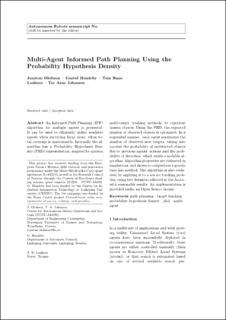Multi-agent informed path planning using the probability hypothesis density
Peer reviewed, Journal article
Accepted version

Åpne
Permanent lenke
https://hdl.handle.net/11250/2723444Utgivelsesdato
2020Metadata
Vis full innførselSamlinger
Sammendrag
An Informed Path Planning algorithm for multiple agents is presented. It can be used to efficiently utilize available agents when surveying large areas, when total coverage is unattainable. Internally the algorithm has a Probability Hypothesis Density (PHD) representation, inspired by modern multi-target tracking methods, to represent unseen objects. Using the PHD, the expected number of observed objects is optimized. In a sequential manner, each agent maximizes the number of observed new targets, taking into account the probability of undetected objects due to previous agents’ actions and the probability of detection, which yields a scalable algorithm. Algorithm properties are evaluated in simulations, and shown to outperform a greedy base line method. The algorithm is also evaluated by applying it to a sea ice tracking problem, using two datasets collected in the Arctic, with reasonable results. An implementation is provided under an Open Source license.